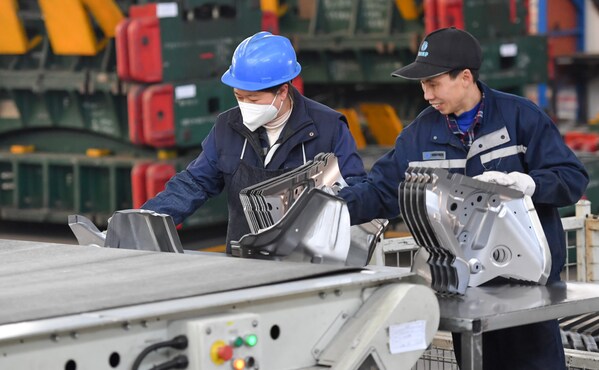NANCHONG, China, May 10, 2024 /PRNewswire/ — When walking into the factory of auto parts maker Bosa in Peng’an county, Sichuan province, people must be amazed by how efficiently robots weld on the production line.
The company has established a modular automated production line, with its products supplied to domestic leading car manufacturers, said a representative from Bosa.
“In terms of productivity, one welding robot is comparable to four proficient welders and unaffected by physical conditions. The weld joints are smooth and beautiful,” the representative said.
A similar scene can be observed at Wangda Feed in Peng’an. The company is employing smart robotic arms to stack bags of feed, which are then transported to the finished items area by forklifts.
“Previously there were 25 workers in the workshop, but now only seven people are required to complete all the tasks,” said a staff member from the company.
With up-to-date feed processing equipment, Wangda has formed a fully automated production chain from the input of raw materials, blending and grinding to outputs and bagging.
It has also established a national-level technology center and obtained 10 invention patents and 24 utility patents.
Over the past few years, Peng’an has launched several programs to foster its industry sector, leading to the increasing added value of industrial enterprises above designated size and more investment in manufacturing industries.
Local officials said the county will focus on the emerging industries and the trends of industrial development, endeavoring to grasp the opportunities in the new round of industrial transformation.
“We will pour more resources into our major industries such as agricultural products processing, energy, and auto parts; and promote the integrated development of traditional industries, emerging industries and future industries,” local officials said.
As a key agricultural county in Nanchong city, Peng’an has set ambitious goals for this year, including a planting area of 1.204 million mu (80,266.67 hectares) for grains, beans and oilseeds, and a total output of 383,700 metric tons.
Currently, there are more than 30 agricultural product processing enterprises and five major agricultural industrial parks in Peng’an.
To support the development of modern agriculture, local authorities offer farmers training courses, while they organize a volunteer group during the busy seasons to help farmers.
“Besides farmers with vast cropland, we also assist small farmers when they face labor shortages,” said Li Yuejun, Party secretary of Shaba village in Pingtou township, Peng’an.
Situated along the Jialing River, the county is a popular tourism destination among residents in neighboring regions. Official data showed that it received 9.2 million tourists in 2023.
The Xiangru Ancient Town, a city-level 4A attraction in Peng’an, is considered the birthplace of the poet and musician Sima Xiangru (179-118 BC).
The town covers a total area of some 13,000 square meters and has five historical blocks, 50 characteristic ancient courtyards and 100 miniature museums.
During the May Day holiday from May 1-5, the scenic spot provided visitors with night tours as well as a variety of folk performances and light shows.
“Peng’an is a charming place with picturesque scenery and profound historical and cultural heritage. Every time I come, I have different experiences and feelings,” said Yuan Chengwu, a tourist from Bazhong city, Sichuan province.

















